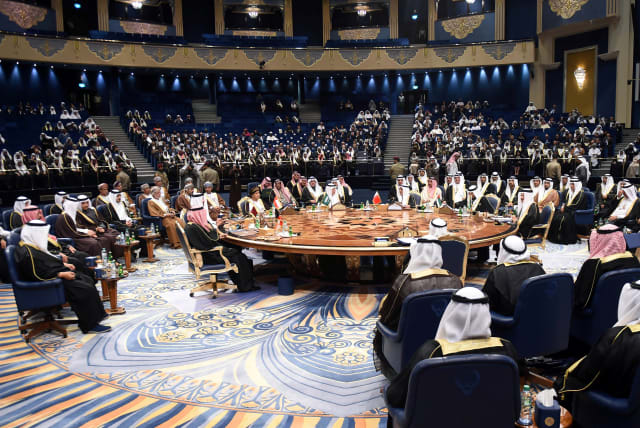Gulf states and US seek MidEast stability, Iran 'de-escalation'

The US and Gulf powers reportedly welcome diplomatic engagement with Iran despite Tehran's history of malign activities.
Several Gulf states from the Gulf Cooperation Council held important meetings in Washington this week with their US counterparts.
“Gulf states and the US said they welcomed the diplomatic engagement with Iran and are seeking to stop any escalation in the region, a joint statement issued by the minister said,” Saudi Arabia-based newspaper Arab News reported.
The organizers of the meeting said in a statement: “Ministers welcomed diplomatic engagement by Saudi Arabia and other GCC states with Iran to pursue regional de-escalation and emphasized the importance of adherence to international law, including the UN Charter, by states of the region.”
The meeting underlined several issues of common concern, such as freedom of navigation at sea, and called on “Iran to cease its proliferation of unmanned aerial vehicles and other dangerous weapons that pose a grave security threat to the region.”
Iran uses its drones to menace ships
Iran has used drones to harass and target ships over the past several years. While it has sought to reconcile with Saudi Arabia, it is clear that the Gulf states still want a robust US role in the region to deter Iran’s shadow.
The US has said it wants to deter Iran via more naval vessels and warplanes in the region, while the Gulf wants stability and de-escalation.
“US Secretary of State Antony Blinken welcomed Saudi Arabia hosting a delegation from Sanaa in Riyadh,” with the Saudis seeking to extend a peace deal in Yemen, Arab News reported.
Meanwhile, Saudi Defense Minister Prince Khalid bin Salman held meetings as well, while the countries discussed the Israeli-Palestinian issue.
The UAE cited a dispute over several islands in the Gulf, stressing the “importance of Iraq’s commitment to Kuwait’s sovereignty and territorial integrity and respect for international conventions and UN resolutions.”
Some of the countries expressed concerns about Iran adhering to its commitments to the International Atomic Energy Agency regarding nuclear issues. They also discussed Syria’s role in the region.
It is significant that Gulf states are conducting this kind of outreach in the US amid continued discussion about possible Saudi-Israel normalization and a new economic corridor from India via the Middle East to Europe.
Jerusalem Post Store
`; document.getElementById("linkPremium").innerHTML = cont; var divWithLink = document.getElementById("premium-link"); if (divWithLink !== null && divWithLink !== 'undefined') { divWithLink.style.border = "solid 1px #cb0f3e"; divWithLink.style.textAlign = "center"; divWithLink.style.marginBottom = "15px"; divWithLink.style.marginTop = "15px"; divWithLink.style.width = "100%"; divWithLink.style.backgroundColor = "#122952"; divWithLink.style.color = "#ffffff"; divWithLink.style.lineHeight = "1.5"; } } (function (v, i) { });

